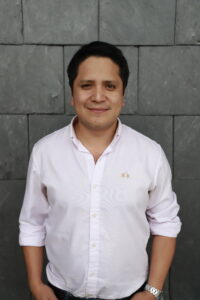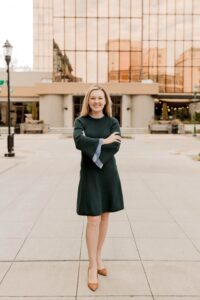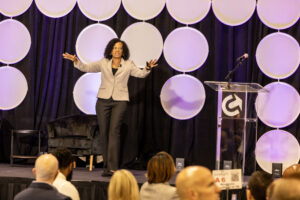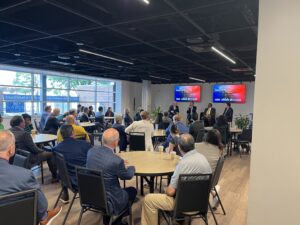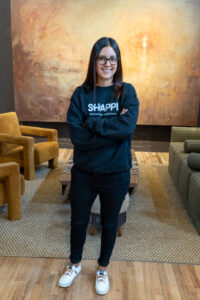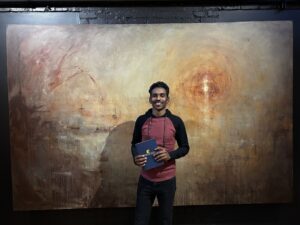Natalia Pérez, Marketing & Communications Intern
Between its killer views, rich art scene and growing entreneurship, our Scenic City is a triple threat: ideal location, landscape and job opportunities. For longtime locals and those who've recently settled in the city, it doesn't take long to feel right at home in the Chattanooga community.
Despite economic uncertainty during the pandemic, Chattanooga has thrived, leading USA Today to rank us No.10 for job growth in 2020, and PCMag to name us a top work-from-home city (we brag about this often!). All of these perks partnered with Chattanooga's laidback, ecclectic culture make for some amazing and unique job opportunities and great talent.
Meet some people with unique jobs in Chattanooga:

Quincy Jenkins, Executive Director of DEI, Chattanooga State
Quincy Jenkins is the inaugural executive director of Diversity, Equity and Inclusion (DEI). Jenkins, a native of Carrolton, Georgia, comes to Chattanooga State after most recently serving as the inaugural Director of Latinx Outreach at Dalton State for seven years, which helped to its becoming Georgia’s first Hispanic-Serving Institution. A current doctoral candidate at Vanderbilt University’s Peabody College, Jenkins brings 12 years experience in higher education to Chattanooga State as well as proficiency in English, Spanish, Italian and Chamorro/Guamanian languages.
Trend: Tell us a little about what you do.
Jenkins: So, I'll receive our institutional, best practices for building an inclusive environment; whether that is through student success and academic area, those with different abilities and their disabilities, and making sure our students from low income areas or in underrepresented racial and ethnic backgrounds are also being served correctly. That involves our commitment to diversity, what diversity means and in the individual context, and equity — and equity is just removing barriers to give people more access to the institution. We're seeing a large increase of our Latinx/Hispanic population, and we're also seeing Afro-Latinos within that, as well as indigenous groups. Getting our minds around human identity, and how we make space for different identities is the key to all of it.
We need to have broader conversations about what diversity really is and how it all works in different contexts, and how all of these identities can change over a lifetime. How do we make sure that all humans feel included within a certain space? That's the goal of my work.
Trend: Tell us about a challenge in your job.
Jenkins: Change is hard. If your world is changing around you very quickly, it's hard to grasp what's going on. The best thing we can do is listen, yet many of us will retreat, or tend to be against something we see as threatening because of our fear. So the biggest challenge is getting us to recognize that even though the world is changing, that can be a good thing, because it makes us all better. So we don't have to be threatened by new demographics, LGBTQ populations, etc. Including others doesn't take away from your slice of pie; that's a false idea. There's enough pie for everyone.
Trend: What are your top goals at your job?
Jenkins: To increase our student retention and graduation rates among our students of color, and especially our low-income students. Having students succeed through equitable practices, increasing our engagement with students with diverse abilities/neurodiversity, and ultimately making Chattanooga State a more kind and thoughtful place for employees.
Trend: What do you find unique about your position?
Jenkins: It's the first of its kind that has been created in this institution. It's so broad in scope, and this position cannot be successful if it doesn't work with every other position on campus. We're an office of three people with a small budget, so a lot of my strategies and goals are to connect with the Vice President's economic affairs, workforce development, technology, HR, etc. Each department needs to work together to represent the diversity of our student population with our different skills and goals. It involves a lot of 'people-ing' and thoughtfulness to make it work.

Jeff Greenspan, Comedian
Jeff Greenspan is a comedian, activist and artist. He also freelances as an advertising writer and creative director on the side. Prior to doing comedy, he was BuzzFeed’s first Chief Creative Officer, worked closely with “Zuck” at Facebook to launch Timeline, and wrote for filmmaker Michael Moore. After 80 days of quarantine, he and another NYC comic headed down to Tennessee to become “Comedians in Residence” at Humanaut.
While here, they lived in Chattanooga’s Bode Hotel, where they pitched to host a socially-distanced comedy show in their lobby for a night. It went so well that they decided to make it a regular thing. Eight months later, Greenspan has sold his place in Brooklyn, moved to “The Noog,” and is running The Carpetbagger’s Comedy Night, where his NYC comedy pals travel down to perform alongside Southeast favorites. Before COVID, he was a regular at Standup NY and Gotham. Nowadays, his standup can be seen on Netflix, and all around the Southeast.
Greenspan is still living in a room in Chattanooga's Bode Hotel, which makes him feel like a nomadic poet artist in New York who lives in a hotel.
Trend: Tell us about your experience doing comedy at Bode Hotel. What have you experienced of Chattanooga's culture?
Greenspan: I've become friends with the staff here and with many people in the audience. I've also gone to some of their weddings. The show has really taken on this bizarre, weird, unique turn. I mean, you know, when the show started, we had a karaoke machine speaker and microphone as our sound system. And the audience was pretty much just hotel guests who were getting free tickets. And hotel guests are terrible audiences because they haven't made any sacrifice to come here. They haven't gotten a sitter. They didn't get dressed up. They're just not really invested.
So now the show has grown to where one of the guys who works at the hotel built a custom stage out of one of the high end, fancy ping pong tables, the hotel invested in a $1,300 sound system and the audience is now 100% non-hotel guests. The people who like it have brought their friends, so it's a real fun and engaged audience. Chattanooga is very community-oriented, and that's something you don't have in New York City. There's no such thing as a community. Here, I've become entangled in everyone's lives, and that's what kind of drew me to decide to put down roots.
Trend: How has the comedy scene in Chattanooga differed from the one in New York?
Greenspan: It's not as frequent, you know, in New York, I would be getting up two or three times a day, and here — even probably during pre-COVID times — the best you may get for open mics is 2 to 3 times a week.
Comedy is a brutal community, no matter what, no matter where you work, no matter where you place it. It tends to be because it's such a solo effort that people tend to be in it all for themselves. But I do think there is more cooperation down here that there is in New York, and maybe only because you have to when it's a smaller scene. It's a smaller community, and you see people supporting each other a bit more down here than in New York.
For instance, in New York, if you go to a mic, it's very common just to go to the mic and, the minute you get done, you leave, because you got to literally run to another mic. Here, it's different. You stay for the others and you support each other.
Trend: Where do you draw most of your content from?
Greenspan: I personally draw my content from like, my personal life and my observations. Lately, I've been trying to, you know, I've been in a lot of therapy. So I've scraped through my memories and my neuroses. And I tried to draw from those because I tend to feel no matter how nuts I think I am, there's someone else out there who feels just as much or just as lonely or just as weird. And when you see someone else get out that weird thing, someone else feels that weird thing. I don't feel so alone.
Trend: What do you feel is most unique about your job?
Greenspan: Living in a hotel as a comedian in Chattanooga pretty much sums it all up!
Rachel Jobe Reese, Director and Curator at the Institute of Contemporary Art
The University of Tennessee at Chattanooga (UTC) launches the Institute of Contemporary Art (ICA) at UTC—the first ICA in the state that will open its doors in spring 2021. The ICA at UTC will be free and open to the public.
Following a multi-year renovation at the UTC Fine Arts Center, the university’s contemporary art gallery and exhibition program—the Cress Gallery of Art—will be rebranded with an updated, more public-facing mission and expanded visual identity as the ICA at UTC. Officially founded in 2000, the Cress Gallery of Art bears the name of artist and UTC Guerry Professor of Art Emeritus George Ayers Cress (American, 1921–2008). The Cress gained national reputation from its Diane Marek Visiting Artist Series, which operated from 2006-2018 and was a cherished program and tradition at UTC. General operating support for the ICA is provided by UTC.
Rachel Reese, appointed as Director and Curator of Cress Gallery of Art in January 2020, will transition into the role of Director and Curator of the ICA at UTC and lead its future visioning and growth.
Trend: Tell us a little about your job as the Director and Curator at the ICA @ UTC – what does your daily routine look like? What are your responsibilities?
Reese: As the Director and Curator of the Institute of Contemporary Art (ICA) at UTC, I provide the artistic vision, direction and coordination of the ICA’s artistic and exhibition program, as well as steward and manage the permanent fine art collection for the University. Essentially, through my role as a contemporary curator on campus, my role is to share UTC’s vital and critical commitment to contemporary visual arts to others more broadly.
Sometimes I think about myself as a producer in a way—a producer that’s related to the mission of the ICA. You have to wear many hats. So not only am I thinking about putting on exhibitions and working with artists, I’m also a public figure in the community, I am called on to give talks and lectures, I think about programming and education and even budgeting, fundraising and financial support: keeping up with a lot of spreadsheets and answering emails and just keeping all of these pieces in play together and organized is really what’s required of you. I do a lot of emailing! Every day is different, and it’s such interesting work and I think we have to try to remember the core of why you do what you do. For me it’s being able to work with living artists and kind of see what makes them tick and how they’re responding to living in today’s climate and what that means in terms of the objects they’re making and the conversations they want to have, but there’s so much more that goes into it.
This is the first ICA in the state that will open its doors, which is very meaningful and exciting. How did this come to be?
Reese: 2020 was the 40th anniversary of the Fine Arts Center, and the 20-year mark of the George Cress gallery on campus. Even with Covid, it was an exciting time on campus, with multiple capital renovations underway. The Fine Arts Center—which houses the ICA, studios, classrooms and lecture hall for the Department of Art; and classrooms, theatre and concert hall for the Department of Performing Arts—underwent a major capital renovation through Fall 2020. The Cress Gallery had gone through significant change, evolution, and growth and was looking to move into a new era.
Trend: What is your vision for this ICA?
As the first ICA in Tennessee, my vision is to present challenging, curious, and adventurous encounters with contemporary art and artists. The ICA will drive socially-responsive connections within our campus community, with Chattanooga and TN publics, and encourage thought production around global contemporary art practice. Driven by values of openness, inclusivity, and honesty, we will always be free and open to the public and believe that art celebrates our human experience in its unique place and time. I want to leverage our resources and unique conditions at UTC to build an artist-centric ICA that focuses on collaborating with and exhibiting work by living artists instead of building a comprehensive art historical collection.
I am also paying attention to and aware of the need to honor the original function of the Cress Gallery of Art and the university community who has sustained the gallery for the last twenty years. Originally named for UTC Professor and painter George Ayers Cress, I will continue to build the institution with artists in mind by working to bring the past to the present and not let go of it completely, while at the same time proving we are ready to grow and evolve. I am really thinking about what I want this ICA to be and what kind of platform I want to give to artists. I definitely want it to be artist-centered and artist-driven institution.
In that spirit, it’s also really important that the ICA become a creative hub and epicenter for all departments at UTC, not just the art department (even though we are located in the Fine Arts Center). Truly in the spirit of an arts destination, the ICA should become a major campus asset and create a cultural sphere of influence in Chattanooga and TN via UTC. I am planning for its future brand and visual identity – a re-imagined campus- and community-wide contemporary arts destination that points to the growth of contemporary art in the state of TN and the need for a bold institutional leader.
Trend: What do you find unique about your job?
Reese: Being a curator is about pursuing and making ideas—it’s a very intellectual field and role—but part of a curator’s responsibility is thinking about others, other audiences. Coming into the director/curator role as a curator, I see my position at not only as an administrator but also as someone who can create space to elevate and promote the voices of new artists and curators to address the unique context of where we are: Tennessee and the city of Chattanooga. I want to make sure we’re providing a platform for a lot of different types of voices and that we’re not simply being a mirror for conversations that are happening in the world, but rather we’re opening up new conversations. You don’t want to be creating ideas in a vacuum or presenting artworks or exhibitions in one either. I want to make ideas accessible, otherwise why share them? That’s the fun.
Job seekers will also want to check out ChattanoogaCalling.com, a new website the Chattanooga Area Chamber of Commerce launched to help local residents find jobs fast. The ChattanoogaCalling.com website also gives job seekers information about local training programs that could elevate career prospects. Connecting people who want jobs with thousands of jobs in the region, ChattanoogaCalling.com provides resources for training to learn the new skills needed to fill high-demand jobs.

